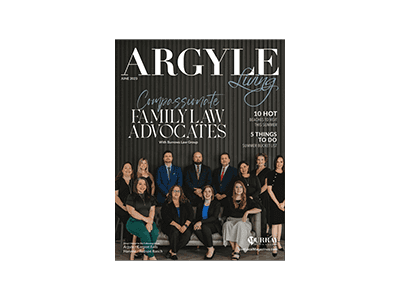




Denton Divorce Attorney
Helping Clients Begin Their Next Chapter
Couples walk down the aisle with dreams of happily ever after filling their minds. In reality, about half of marriages end in divorce. The breakdown may happen early in the union or after decades together. Either way, in addition to working through the pain and disappointment, there is also a multitude of legal details that must be resolved.
At Burrows Law Group, our compassionate and results-driven approach as a divorce lawyer in Denton can help you move forward to your new life beyond your marriage.
Contact us online or by calling (972) 236-7798 today!
Seasoned Legal Counsel for Denton Contested & Uncontested Divorces
The nasty, drawn-out divorce dramas might get the media coverage, but not all divorces are like that. In some cases, spouses have simply concluded they cannot remain married. There are no disagreements over who gets what or where any minor children will live.
Uncontested divorces are either concluded through mutual agreement or by default if the spouse served does not file an answer or appear in court. These divorces are usually simpler and faster than their contentious counterparts, but spouses are best safeguarded with experienced legal representation from a divorce lawyer. At Burrows Law Group, we can draft the settlement agreement, help determine a parenting plan, negotiate when necessary with the other spouse’s attorney, and answer any other divorce question that arises. Importantly, we can point out potential pitfalls that you or your spouse may not have considered.
A divorce is contested when the served spouse files an answer in disagreement or refuses to sign the final divorce decree. Contested divorces must be settled in court before a judge. These divorces are by their nature more complex. Spouses can dispute any element of their divorce from child custody to alimony to dividing business interests.
Detailed preparation and a strategic plan are crucial for navigating contested divorces. Our team of divorce lawyers thoroughly examines financial records, custody arrangements, and other vital aspects to build a robust case tailored to your objectives.
A divorce decree is more than ending a marriage. The details can have long-range impacts. Understanding your rights and options is critical. With us, you gain clarity on potential outcomes and how each decision may affect your future.
Divorce Residency Requirements in Denton
States generally require a certain residency standard to be met to file for divorce. Residency discourages people from moving to a state for the sole purpose of divorcing. Texas is no different.
Residency requirements to file for divorce in Denton are as follows:
- Either spouse must have been living in Texas for the preceding six months before filing for divorce.
- Either spouse must have resided in the county in which the suit is filed for the preceding 90 days.
Even if you do not live in Texas, you can file in this state if your spouse has met the residency requirements. Time spent outside the state while serving in the U.S. military is counted toward the requirement.
Understanding residency requirements is essential because failure to meet them can result in delays or dismissal of the filing. Our legal team ensures all filings are completed correctly and efficiently, capitalizing on our thorough knowledge of local and state laws.
Divorce Grounds in the Lone Star State
There are seven grounds for divorce in Texas. One of these grounds is considered a no-fault divorce where neither spouse is being blamed for the demise of the marriage. The remaining six grounds are fault-based where one spouse is assigned responsibility for the break-up. Fault grounds must be proven.
Divorce grounds in Texas are as follows:
- Insupportability. This is the Texas equivalent of irreconcilable differences. Some disagreements or differences cannot be repaired. Insupportability is the state’s only no-fault option.
- Cruelty. This fault ground covers when one spouse makes it unbearable for the other spouse to continue living together. The definition of cruel is purposely left open to interpretation.
- Adultery. When one spouse cheats on the other, adultery grounds might be possible.
- Conviction of a Felony. If a spouse is convicted of a felony during the marriage and incarcerated for at least one year, the other spouse can use this ground to end the marriage. An exception, however, is this ground cannot be used if the spouse’s testimony in court was used to convict their partner.
- Abandonment. This ground is viable when one spouse intentionally abandons the other and remains gone for at least one year.
- Living Apart. When two spouses live apart for at least three years, filing for divorce on the grounds of “living apart” is possible.
- Confinement in a Mental Hospital. When a spouse is confined to a mental hospital for at least three years with no sign they will get better, the other spouse can file for divorce on this ground.
Choosing the appropriate grounds for divorce can strategically influence the proceedings and outcomes. It is essential to understand how each ground impacts the division of assets, alimony, and custody. Our team of divorce attorneys is committed to guiding you through these choices with clarity and understanding.
Dividing Property in Denton Divorces
Texas is one of nine states that follow the doctrine of community property when determining how assets and debt should be divided. Only community property is divided between the divorcing spouses. Each spouse keeps their separate property. Community property is generally split equally between the spouses unless there are supporting reasons for not doing so. A judge considers proven fault grounds when making their decision.
Texas law defines property as either community or separate. Separate property is typically any asset owned by one spouse before the marriage and community property is any asset acquired during the marriage. The presumption is property is community until one spouse demonstrates by a preponderance of the evidence that the asset is separate property. Our attorneys at Burrows Law Group are skilled at making effective arguments for appropriately classifying property for our clients.
Tackling property division is detailed and complex, often requiring the valuation of assets like businesses, real estate, and retirement accounts. We guide clients through this process with a thorough evaluation to ensure a fair distribution under Texas law.
Child Custody & Support
No part of divorce is more emotional than the effect on minor children. Parents want what is best for their children but can disagree on what that means. We zealously advocate for our clients’ position on what serves the children’s best interests.
Instead of custody, Texas uses the term conservatorship, which can be granted to one or both parents.
There are three basic types of conservatorship (custody) in this state:
- Sole Managing Conservatorship. A parent with sole managing conservatorship has the legal right to make all decisions for the child. This parent makes such decisions as where the child lives, what school they attend, whether they go to church, and if the child needs medical attention.
- Joint Managing Conservatorship. In a joint managing conservatorship, both parents share the rights and duties of decision-making for their children. The right to decide where the child lives can be granted to one parent under this type of conservatorship.
- Possessory Conservatorship. Possessory conservatorship is the equivalent of visitation. This type is often granted to one parent if the other parent is named the sole managing conservator.
In most cases, both parents are given reasonable access to their children. Texas wants parents to build meaningful relationships with their children. Custody and visitation in Texas can be denied if a judge determines that a parent is a danger to their child.
No matter the custody arrangement, both parents are financially responsible to support their child’s health and well-being. The parent with physical custody of the child is paid child support by the non-custodial parent. How much is paid is calculated by using a standard formula that includes income, health insurance costs, and other financial resources and obligations. The number of children needing support is a multiplier. A judge has the authority to go outside of the guidelines when circumstances warrant.
Custody arrangements can often involve high stakes and intense emotions. We assist parents in crafting parenting plans that reflect their children's unique needs while accommodating each family member's evolving dynamics.
Alimony (Spousal Maintenance) in Texas
One spouse can be granted temporary maintenance while the divorce is underway, especially if one spouse is unemployed or makes significantly less than the other spouse. A temporary award does not guarantee support after the divorce is finalized.
Statutes governing alimony in Texas are among the most restrictive in the country. In most cases, maintenance won’t be awarded unless the marriage lasted for at least 10 years. Exceptions are made if the spouse seeking support has a mental or physical disability or if that spouse has custody of their disabled child who requires special care. The length of the marriage is one of the factors in determining the duration of maintenance.
Understanding the specifics of alimony is crucial when financial support is a concern. We provide guidance on how to approach negotiations or court proceedings to pursue fair maintenance arrangements, considering both statutory regulations and personal circumstances.
Frequently Asked Questions on Divorce in Denton
How Long Does a Divorce Take in Denton?
The duration of a divorce process in Denton can vary significantly depending on the complexity of the issues at hand. An uncontested divorce, where both parties agree on all terms, can be completed relatively quickly, often within a few months. This is because Texas imposes a mandatory 60-day waiting period from the date of filing before a divorce can be finalized. However, contested divorces where parties disagree over major issues like property division, child custody, or support can take much longer, sometimes a year or more, as they may require extensive negotiations or even trial. At Burrows Law Group, we aim to resolve divorces efficiently while ensuring fair outcomes for our clients, acknowledging that prolonging the process can add unnecessary stress and expense.
What Can I Do if My Spouse is Hiding Assets?
Hiding assets during a divorce is not only unethical but also illegal. If you suspect your spouse is concealing assets, it's crucial to address this issue promptly. At Burrows Law Group, our divorce attorneys are adept at uncovering hidden assets through thorough financial analysis and the use of discovery tools. This may involve reviewing tax returns, bank statements, and other financial documents, and possibly working with forensic accountants. Texas law requires full and honest disclosure of all financial holdings during divorce proceedings, and failure to do so can lead to penalties, including awarding a greater share of the remaining assets to the non-offending spouse. Taking proactive steps can ensure a fair division of property, upholding your rights and interests.
How Does Mediation Work in a Denton Divorce?
Mediation serves as a valuable tool in divorce proceedings in Denton, aiming to reduce conflict and create amicable solutions between spouses. It involves a neutral third-party mediator who assists the couple in negotiating the terms of their divorce. Mediation can address many aspects of a divorce, including property division, child custody, and spousal support, often leading to a more amicable resolution without the need for a stressful trial. Participating in mediation can often result in faster settlements and is cost-effective compared to prolonged litigation. At Burrows Law Group, we counsel clients through mediation, helping to clarify their goals and priorities to facilitate a beneficial agreement.
Can I Modify a Divorce Decree After It’s Been Finalized?
In certain circumstances, Texas law allows for the modification of a divorce decree. This is particularly true for orders relating to child custody, visitation, or support, where changes in circumstances—such as a significant change in income or relocation—warrant revisiting the agreement. However, modifications related to property division are generally harder to readdress unless there is evidence of fraud or concealment during the initial proceedings. At Burrows Law Group, we guide clients through the process of seeking modifications, ensuring that any changes are handled appropriately and in compliance with legal standards. Our knowledge and experience in the field can help you understand your options and take the necessary steps in case of significant life changes.
If you are thinking about divorce, schedule a consultation with us. We can answer your questions and offer potential strategies. From uncontested divorces to high-conflict splits, you can trust the experience and knowledge of our team of attorneys. Call us at (972) 236-7798 or reach out through our online form.
An Experienced Team
You Can Trust
-
 Adam Burrows Attorney at Law
Adam Burrows Attorney at Law- Family Law,
- Small Business Formation
-
 Daniel Dower Attorney at Law
Daniel Dower Attorney at Law- Family Law,
- Small Business Formation
-
 Jennifer Hicks Attorney at Law
Jennifer Hicks Attorney at Law- Family Law,
- Child Custody,
- Adoption,
- Divorce,
- Prenuptial Agreements,
- Property Division,
- Restraining Orders,
- Same Sex Marriage
-
 Brielle Ward Attorney at Law
Brielle Ward Attorney at Law- Family Law
-
 Dr. Jessica Burrows In-House Counselor, Chief Financial Officer
Dr. Jessica Burrows In-House Counselor, Chief Financial Officer -
 Dale A. Burrows Of Counsel
Dale A. Burrows Of Counsel- Family Law
-
 Lily Lord Paralegal
Lily Lord Paralegal -
 Jennifer Mulford Legal Assistant/Billing Coordinator
Jennifer Mulford Legal Assistant/Billing Coordinator -
 Christian Mathis Firm Administrator/Intake Specialist
Christian Mathis Firm Administrator/Intake Specialist -
 Madison Duehr Family Law Paralegal
Madison Duehr Family Law Paralegal -
 Melissa Ruden Board Certified Paralegal
Melissa Ruden Board Certified Paralegal































